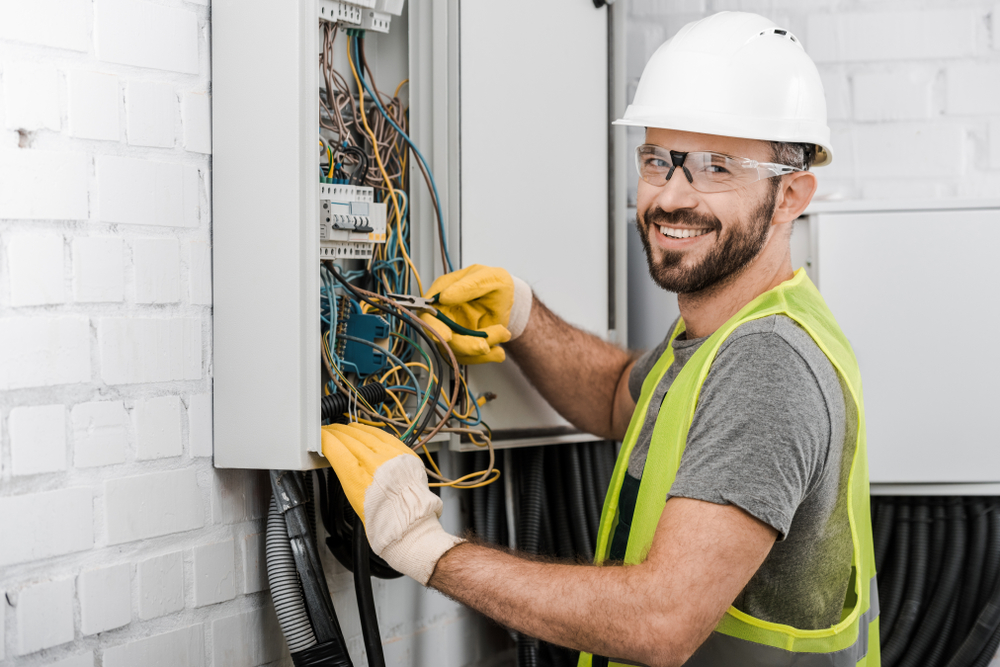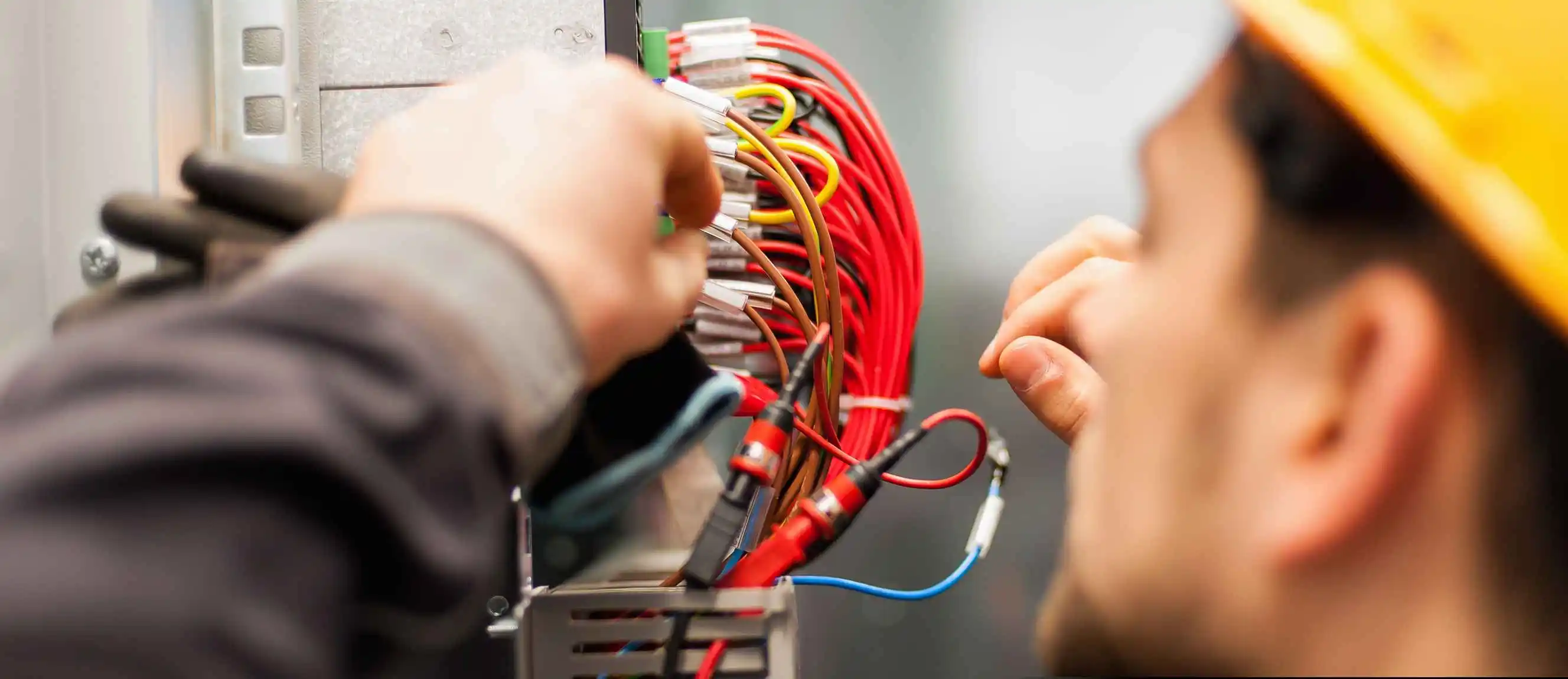Optimizing Efficiency: Exactly How Licensed Electrical Contractors Improve Industrial Electrical Infrastructure
Optimizing Efficiency: Exactly How Licensed Electrical Contractors Improve Industrial Electrical Infrastructure
Blog Article
The Comprehensive Function of Industrial Electricians in Ensuring Reliable Power Distribution and Electric Upkeep in Industrial Settings
The duty of industrial electrical experts expands far beyond standard electrical tasks; they are integral to the stability and efficiency of commercial procedures. Their obligations incorporate installation, maintenance, and repair of intricate electric systems, guaranteeing conformity with rigorous safety requirements. As markets advance, the assimilation of smart systems and sophisticated modern technologies presents new difficulties and possibilities for these professionals. Comprehending how their competence not just safeguards functional continuity but likewise adds to sustainability initiatives elevates crucial concerns regarding the future landscape of electric upkeep in industrial settings. What ramifications does this have for the workforce and technical advancement?
Importance of Industrial Electricians
In several commercial setups, the function of electrical experts can not be overemphasized. Industrial electricians have specialized knowledge of intricate electrical systems, consisting of high-voltage equipment and automated equipment, which are important for modern-day industrial procedures.
Additionally, the need for competent electrical experts remains to expand, driven by developments in modern technology and enhanced dependence on automated systems. As industries progress, the need for electrical contractors who can install, repair, and maintain advanced electric facilities comes to be paramount. Their payments expand beyond simple setup; they are key gamers in making sure compliance with safety and security regulations and market criteria, thereby reducing threats linked with electrical failures.
Secret Duties and Duties
Industrial electricians often participate in a selection of vital responsibilities that are important to the smooth operation of power distribution systems. Among their main obligations consists of mounting, preserving, and fixing electrical wiring and tools in industrial settings. This involves ensuring that electrical systems follow safety policies and industry standards to avoid dangers such as electric fires or equipment failing.
In enhancement to installment tasks, commercial electrical experts are responsible for troubleshooting and detecting electric concerns. They use specialized tools and methods to identify faults in machinery and power distribution networks, ensuring that any kind of breakdowns are immediately dealt with to reduce downtime. licensed electrical contractor. Normal upkeep is one more crucial aspect of their function, where they do preventive measures and regular evaluations to maintain systems operating ideally

Credentials and skills Required
Effectiveness in electric systems is crucial for industrial electrical experts, as it enables them to properly navigate the intricacies of power distribution (industrial electricians). A strong structure in electric theory, consisting of knowledge of circuits, voltage, present, and resistance, is crucial. Industrial electrical contractors have to possess a detailed understanding of electric codes and policies to make certain compliance with market criteria
Along with technological expertise, useful skills are extremely important. Efficiency in troubleshooting and problem-solving allows electrical contractors to identify and settle issues effectively, lessening downtime in commercial procedures. Familiarity with different devices and tools, such as multimeters, oscilloscopes, and power analyzers, is additionally necessary for efficient repair and maintenance.
Moreover, industrial electrical contractors are usually called for to have formal education, generally culminating in an associate level or completion of an apprenticeship program. These programs provide hands-on training and theoretical knowledge, gearing up electrical experts with the skills required for the field.
Certifications, such as those from the National Institute for Certification in Engineering Technologies (NICET), can further enhance an electrician's qualifications, showing expertise and commitment to the career. On the whole, a mix of education and learning, useful experience, and technical skills is vital for success in this requiring function.
Security Criteria and Compliance
Conformity with safety and security requirements is a basic facet of the commercial electrical contractor's role in power circulation. Industrial electrical contractors are entrusted with sticking to a multitude of laws and standards developed by organizations such as the National Electric Code (NEC) and Occupational Security and Health Management (OSHA) These requirements guarantee not just the risk-free operation of electric systems however also the defense of workers and equipment.
To attain compliance, electrical experts need to conduct normal assessments and maintenance of electric systems, identifying possible risks and applying restorative actions. This includes correct grounding, circuit security, and making use of suitable individual protective tools (PPE) By maintaining a detailed understanding of both regional and national codes, electrical experts can properly alleviate risks connected with electrical job.
Moreover, commercial electricians play an important duty in training personnel on security techniques and emergency treatments. This education and learning fosters a culture of safety within the office, reducing the possibility of crashes and ensuring that all workers recognize their responsibilities concerning electrical security.

Future Trends in Electric Upkeep
As technology continues to advance, the future of electric maintenance in power distribution is significantly defined by the integration of anticipating analytics and clever systems. These developments allow commercial electrical experts to relocate past traditional reactive maintenance methods, cultivating an aggressive approach that enhances system reliability and effectiveness.
One considerable pattern is the fostering of Net of Points (IoT) tools, which facilitate real-time monitoring of electrical systems. This technology allows for the collection of large amounts of information, supplying understandings right into tools efficiency and prospective failing points. By leveraging predictive analytics, electrical contractors can expect problems before they escalate, decreasing downtime and maintenance costs.
Additionally, the implementation of advanced automation modern technologies is changing electric maintenance. Automated diagnostic tools can quickly recognize mistakes and suggest restorative actions, streamlining the repair procedure. This not just enhances reaction times but additionally minimizes human error.
In addition, the growing emphasis on sustainability is driving the development of energy-efficient services and renewable resource integration. As commercial fields progressively embrace greener techniques, electrical contractors will play a pivotal function in maintaining these systems, ensuring that power circulation lines up with environmental criteria. Generally, the future of electric upkeep assures boosted dependability, effectiveness, and sustainability.
Verdict
In conclusion, commercial electricians are vital to the capability and safety and security of commercial settings. The duty of commercial electrical experts will certainly proceed to broaden in importance.
The role of industrial electrical experts expands much beyond basic electrical jobs; they are indispensable to the security and effectiveness of industrial operations (industrial electricians). Industrial electricians have specialized licensed electrical contractor understanding of intricate electrical systems, including high-voltage equipment and automated equipment, which are necessary for contemporary industrial procedures
Additionally, industrial electrical experts work together with designers and various other professionals to design and apply effective electrical systems customized to particular industrial requirements.Effectiveness in electric systems is vital for industrial electrical experts, as it enables them to properly navigate the intricacies of power distribution.In conclusion, commercial electricians are crucial to the functionality and safety and security of commercial atmospheres.
Report this page